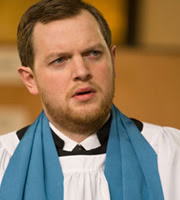 |
| The Mourning of Jesus, Giotto di Bondone |
I slightly fear the sacralising of the every day. Doesn't it go against the spirit of the Incarnation? I resist the extremes of a trend which I worry could lead to the 'holy dusters' of the very blessed dusted vestry being the focus of a special church service each year, or the holy tea lights being lit on 'holy tea light day'. But I'm being facetious.
I think I can be content with 'Holy Saturday', and in my present liturgical incarnation, there is no liturgy offered, no midnight service of watching and waiting, no bonfire to light the paschal candle while we wait for the Easter sunrise. I did witness all that stuff once and my first impression was a) why are the priests dressed like the Klu Klux Klan? and b) wasn't it just like the scene I imagine in the courtyard when Peter sits by the fire the night Jesus is tormented by the Roman Guard, and the girl says 'Surely you are a Galilean also?' and Peter denies it. In other words, bonfires on Easter Eve can be liturgically very confusing for the uninitiated.
 Then there's the theological conundrum. What was Jesus doing all that time? The 'Harrowing of Hell' is one theory - that Christ descended into Hell and brought out the imprisoned spirits there. There's a contested couple of verses in 1 Peter 3 about it. But does that mean they shouldn't have gone there in the first place? Or were they paying off their sin Purgatory-style and were now ready? Is The Harrowing of Hell a bit too Universalist? Just because someone painted it in the Middle Ages it doesn't make it biblical. Or did he only go to the righteous, to proclaim what they already knew? Or was he just reposing quietly in the tomb, waiting for his moment? We assume that if the women went before dawn then Jesus must have risen before that, which makes it very early indeed Sunday morning.
Then there's the theological conundrum. What was Jesus doing all that time? The 'Harrowing of Hell' is one theory - that Christ descended into Hell and brought out the imprisoned spirits there. There's a contested couple of verses in 1 Peter 3 about it. But does that mean they shouldn't have gone there in the first place? Or were they paying off their sin Purgatory-style and were now ready? Is The Harrowing of Hell a bit too Universalist? Just because someone painted it in the Middle Ages it doesn't make it biblical. Or did he only go to the righteous, to proclaim what they already knew? Or was he just reposing quietly in the tomb, waiting for his moment? We assume that if the women went before dawn then Jesus must have risen before that, which makes it very early indeed Sunday morning.I do like the idea that the church has a quiet day every year; a day to recover from the intensity of Good Friday and prepare for the joy of Ester Day. I worry that it could become an excuse for a day off though, when I could be drinking deeply from some liturgical well somewhere.
No doubt my liturgical pot will simmer away gently over the next few years. God is a patient cook. I'll do my best to recover from the Klu Klux Klan bonfire experience and ponder the theology of the credal assertion 'He descended into Hell'. Maybe I'll conclude that as the New Testament is pretty silent on the matter, we are not to know what Jesus got up to between the Friday and the Sunday. And maybe one day I'll 'get' Holy Saturday.
Meanwhile, Lent is almost over and this blog series has come to an end. Happy (nearly) Easter.







































